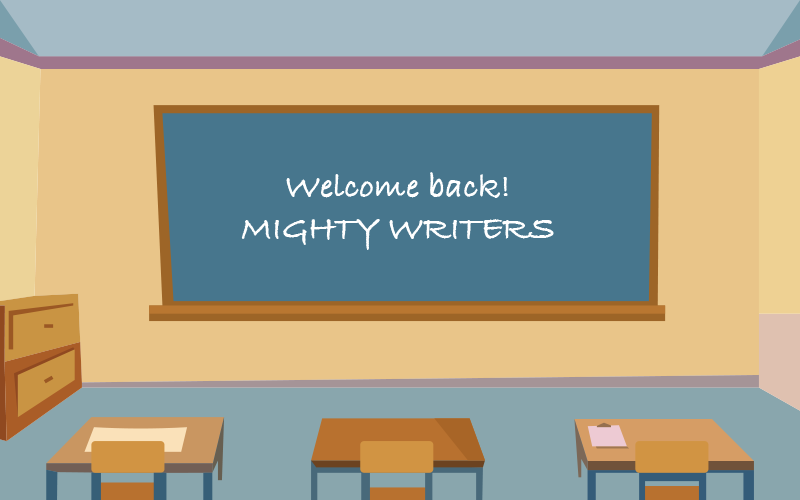Mighty Writers is a non-profit organization. With the mission of “Think clearly and write with clarity,” their food and literacy programs respectively have served over 3,500 kids in low-income inner-Philadelphia neighborhoods. The organization emphasizes how conscious effort towards low-income children is necessary to nourish them in multitudes — to nourish them in ways that aren’t measurable by physical skill. This entails offering them the versatile and vital skill of writing — real writing — skills that can be transferred and concentrated onto other subjects. What Mighty Writers seeks to address is a necessity unmet by state and federal funding. The Smart Set Mag met and conversed with Tim Whitaker, founder and executive director of Mighty Writers, about the organization’s goals and his own, as well as negotiations and experiences working and serving Philadelphia’s communities. This interview has been edited and condensed for clarity.
Kiara Santos: Mighty Writers began in 2009. What is the purpose of its founding? How have those goals transformed now in its 11th year of running?
Tim Whitaker: The only thing I knew how to do was write, and I taught in a [elementary] school right out of college in North Philadelphia for a couple of years, I really liked it — and I was terrible at it. So, I thought to myself “Well, I really like working with kids and writing.” So, I put together a proposal and went around and got seed money. Then I ran into a woman, Rachel Loeper, who is our education director. She was running around the city thinking about the same general idea, so we merged forces.
Then, we just launched [Mighty Writers]. People told us that we would set it all up, design it, and have volunteers there — but it would take a year or two to get the kids to show up [to the program]. We opened the doors, thinking “Okay, we’ll take it as it comes,” and we were mobbed immediately with kids, and it just stayed that way. It took a year for it to settle it down, to get the curriculum, and just get it stabilized. Over time, we just went, “Well, we see it working in South Philly, let’s get it working in West. Let’s get it North, let’s make it bilingual.” And it just kept growing that way.
KS: How have the goals transformed, since being immediately mobbed?
TW: I think the goals have stayed the same, which is why I think we’ve done so well. We are trying to reach economically challenged kids. That’s our thing. We opened in poor communities and communities that are struggling which tend to be the same place where the schools are struggling too. So, we’re looking to get the kids that really need clarity.
We started with this mission: “Think clearly, write with clarity.” We say it over and over again. Everybody says it —everybody that starts working with us gets the mantra. But it carries us right through. Everything we do is to try and get the kids to think clearly before they write. When they’re thinking clearly, good things happen. The kids in our program see their self-esteem goes up when they start thinking clearly. They think “I can be successful. I can find a path.”
KS: You mentioned that teaching was very hard for you, what were the aspects that made it so challenging?
TW: Well, I think it’s that I was young, fresh out of college, so right away I was ill-prepared. Also, I think that poverty creates all kinds of havoc. A lot of the kids came from households that were chaotic or close to chaotic. So, they came to school already out of sorts. They weren’t focused. Maybe they were hungry or there was a situation at home. I wasn’t mature enough or educated enough to know how to deal with those situations.
KS: There’s a familial and cultural tradition of oral storytelling. How does that anchor into the Mighty Writers imitative and into its programs, how is it significant to have our younger generations write?
TW: You’re completely right about that. You have a lot to work with because they already know how to tell a story, they don’t know how to put it on paper, or revise. No one likes to revise, especially kids, they’re like, “I wrote it already! What’s the matter with it?” then you’re getting kids in the head of “Well you have to craft this and make it funny for a general audience.”
Kids [always] do come with stories to tell. We work on those stories. I think that is how the kids are able to get accepted into really great schools. It’s not because they’re kids of color, they’ve seen things and they know how to tell a story. But we teach kids stuff like how to write an email that’s clear, how to apply for a job, basic stuff that you see grown-ups do.
KS: Mighty Writers is a nonprofit, and it is very well known that nonprofits usually fall into this trope of “white saviorism,” which can be seemingly innocent and well-intentioned but nonetheless ignorant outsiders that come into work at nonprofits that are for low-income communities, and the kids usually suffer from these miscalculated intentions. How does Mighty Writers internally go against that trope? To make the kids feel welcome?
TW: The staff, especially the staff on the ground, in the centers, are of color. They’re from the neighborhoods too, more importantly. We have a couple of locations, like the Italian Market in South Philly, that are all run by Mexican instructors.
We have one location in Kennett Square, which has children of mushroom pickers from Guatemala and Mexico, and again the staff is all Mexican and Guatemalan.
So, we certainly have a heightened awareness. The work ethic is paramount. We are aware of all the things that could be said about us, or nonprofits like us, and we know that in most cases they are certainly true, but we keep our heads down and work — we try to reach kids and hire people of color to do the teaching, because they come from those backgrounds, and they understand the kids better than we [higher management] could ever understand them. It’s not going to be the same.

KS: My follow-up to that, what is the hardest conversation you’ve had within trying to go against white saviorism? Something that may have seen happen live-action and thought “this is something we have to take accountability for?”
TW: One thing that happens, and it comes and goes — and this happened when we went virtual — we had all our workshops online for free. We saw this creeping whiteness, these white kids who are seeing it and live in the suburbs. It continues to be something that I’m trying to figure out how to stop.
KS: What do you think constitutes, at Mighty Writers, what ignorance is? Internally within the staff, and to the kids, the ones you work for?
TW: The culture is really set by the kids and the instructors who are them. If you were to go into one of our centers that was largely African American, you would find artwork that reflects them. Artwork, books, the curriculum. All sorts are centered around the culture. Without setting a list of rules, built into our culture.
I think it’s because I step aside in taking control and from being like “my way or the highway,” or “my” curriculum. I’m watching and guiding of course, but at arm’s length. I know people understand the community better than I do, I let them run the show.
KS: Allowing some disclosure of myself and some vulnerability, but I have suffered from food insecurity and there were times as a child I did not want to go back to food programs that were helping me because I felt an energy of ignorance from the instructors, advisors or mentors that did not have experience dealing what was appropriate to say or do to kids of color, those who made large miscalculations concerning the well-being of me and my communities livelihood. What systems do you have in place to combat this sentiment? How do you go from listening to rectifying?
TW: I think COVID was a great example of that, and when COVID hit, like everyone else, we shut down. We have locations all over the city and a few PHA (Philadelphia Housing Association) centers. The first thing we saw was the parents of the kids we work with — this was very apparent in the Mexican communities, but pretty much across the board, was that most of the parents worked in service industries. They worked in kitchens, and they were a lot of immigrants. In the Mexican communities, they tend not to be documented. So, they weren’t going to get any government assistance either. They were hit immediately. It’s a big problem.
We started giving out lunches to the kids at our front doors, and this is when nobody came into the building, we set up, we gave everybody lunches. After a very short amount of time, we saw long lines. But it wasn’t enough. The kids were back being hungry again and the families needed much more. We started looking into groceries and people started asking us for diapers. I mean if you don’t have diapers in a household, it’s a big problem. We formed an alliance with a nonprofit, and it just got bigger, bigger, and bigger.
Even now, every day at five different locations, we give out groceries and diapers, masks, wipes, formula, and all kinds of things. I think we were able to do that successfully because we are embedded into the community. The kids don’t have to travel far to get to our locations. In the case of PHA, they are all around us. Everybody knew us because the kids were going there every day anyways. They trusted us. We kept it as upbeat as we could. We had water ice days, gave away books, we did the best we could possibly do. We took away all the depression-era poverty feel to it, and it worked. I think it’s still working. We still have beach crowds, and we were hearing that in the city, the churches were doing the same, and they couldn’t give the food away. I think it’s because we were there every day before this happened. Trust was built.
KS: According to a recent Philadelphia citizen article, one in five people in Philadelphia suffer from food insecurity, having grown even larger since the beginning of the pandemic. Mighty Writers launched the lunch program to alleviate the insecurity, but where do you see the trajectory of the food program? How do you keep it running in such a poverty-stricken city?
TW: We keep it running because the need continues. If the lines were dwindling, we’d start to talk about it, but the lines are not dwindling. They’re growing. As long as they’re growing and we have the capacity to keep helping, we’re going to keep doing it.
When we announced we were doing it, we were scared shitless. Suppose we run out of money! The opposite happened, the foundations really came through and donors began doubling up on their usual donations and that was across the board. I was all about the food program, we could tell every time we would announce we were going deeper into that, like getting diapers — which is funny we’re a literacy program, what are we doing giving diapers out? People responded right away. You’re serving the community. The community needs literacy, now they need diapers. They need things that are a little more desperate than that. You can’t think clearly if you’re hungry, it’s the basic stuff.
KS: Community is evidently crucial and central to Mighty Writers. If there was no community, there would be no Mighty Writers. It is also crucial for the kids to have a sense of community as well to retain them. How is Mighty Writers fostering a sense of community for the kids and by the kids?
TW: At the centers, the sense is the kids run the program. It’s an identity for them. They come in, on the days they could come in, and for the first half-hour or so they would talk to each other. Nobody’s telling them what to do.
There are superheroes on the walls. Maya Angelou is a superhero. So is Spiderman. There’s a real sense that they’re running the show. It’s not like you can’t talk during [classes]. It doesn’t feel like school. We have a lot of different programs; we have what we call “The Academy.” It runs after school until six o’clock every day. They are the same kids that have to be there every day. Those kids we know really well. We know their family. We know all about them.
Mighty Writers is a real identity for those kids. After school, when kids are walking down the street at one of the locations, I’ll see kids point to other kids and go “that kid is a Mighty Writer!” They know who’s part of the program.

KS: Do you ever get feedback from the kids?
TW: No, it’s more like “I don’t feel like writing today, Mr. Tim.” *laughs* I don’t think they see the big picture of what Mighty Writers is. Sometimes they’ll come up to me and say “Do you own Mighty Writers? Are you rich?” I’ll say “A) I don’t own Mighty Writers, B) I’m not rich.” The writing part they do get. It might take a while, but they do get it. They take it seriously. They know it’ll get them somewhere. Somebody in the family, maybe it’s the grandmother, could be an aunt or a mom, whatever. Somebody sees the light of writing and is pushing that child into it. I see it a lot.
KS: How do you define success at Mighty Writers?
TW: I think it’s continuing to reach a lot of kids. We want to reach as many kids as we possibly can. We have a really good relationship with PHA. For a while, we had a relationship with the city’s rec centers. We thought that’d be great, but it was problematic because the department of recreation is a little chaotic. There’s a lot of turnovers. The rec center lives and dies with whoever the rec center leader is. A lot of the rec centers, we’d put our programs in there, and they’d say, “Can you knock that two-hour program into 30 minutes? I want them doing something else.” It was hit-or-miss all the time. With PHA, they give us a community room and say, “go to it.” They’re thrilled and it’s good for us because it’s the heart of the community we’re trying to reach.
KS: What does failure look like at Mighty Writers?
TW: I don’t know if this is a failure, but sometimes we have dozens of workshops that a workshop leader will come up with something, a topic, things that sound like medicine. If we were to have a workshop called “The ins and outs of violence” or “How to prevent violence in your community” or anything that sounds like that, it’s just not going to be attended. It’s the last thing they want to sit down and talk about. Even if they know how important it is. I think it’s the wording. You have to have some bounce in the workshops. Even when you’re dealing with tough topics, you have to build in some sense of relief. It can’t be “You live in a community where the violence is unbelievable! We have to have another protest!” It can’t be a steady drumbeat of that. There’s got to be the reality of it blended with how you get out of it.
KS: My last question is, how can anyone interested help the mission of Mighty Writers?
TW: You would bring your history, your sense of justice, your heightened awareness of white people. *laughs* •




